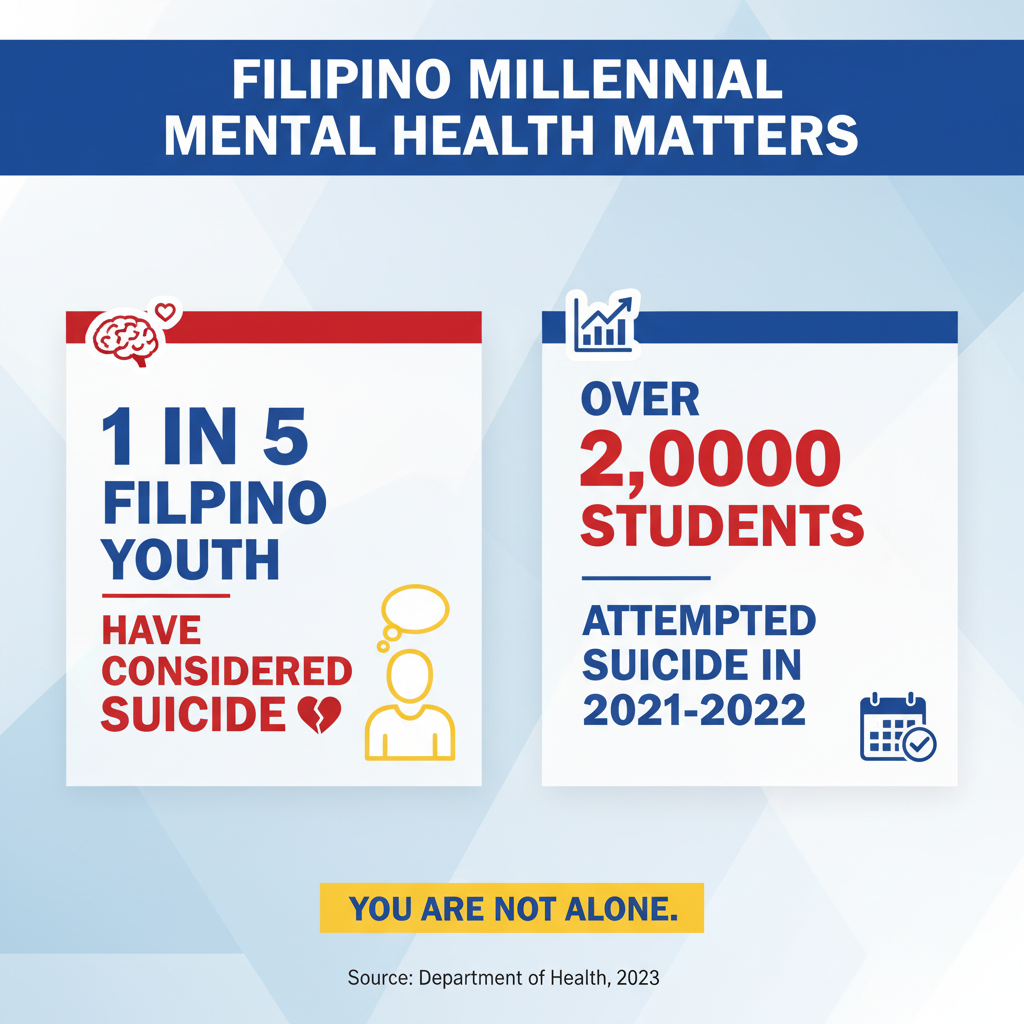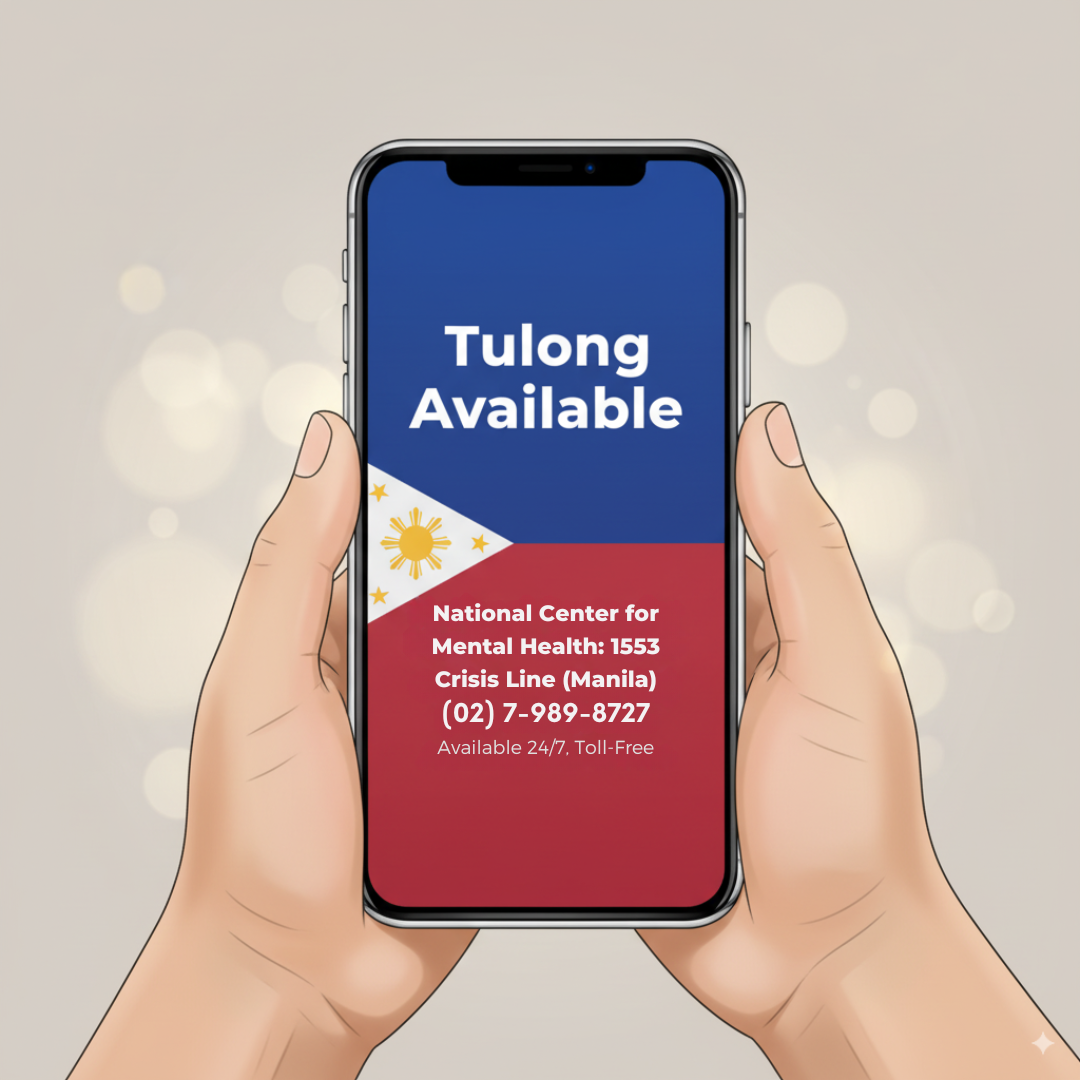

Published on September 10, 2025 By 800ZED

You know that Filipino millennial friend who's always posting perfect food pics and career updates sa social media? The one who seems to have it all figured out on Instagram? Here's a reality check na baka magsave ng buhay: they could be drowning, and you'd never know it.

Nakakagulat ang Statistics. Close to one in five Filipino youth aged 15-24 have ever considered ending their life, according to the 2021 Young Adult Fertility and Sexuality Study. Even more alarming, during the 2021–2022 academic year, the Department of Education reported around 400 students in public schools having committed suicide, with over 2,000 students attempting to take their lives.
For Filipino millennials, the perfect storm of economic pressure, social media comparison, OFW family dynamics, and unprecedented global challenges has created a mental health crisis na nakatago lang. This Suicide Prevention Month, let's pull back the curtain on the silent struggles of an entire generation and explore how pamilya, friends, and communities can become lifelines.
Filipino millennials carry a unique financial pressure na hindi naintindihan ng ibang generation. Unlike their Western counterparts, many are expected to be the family breadwinner while still figuring out their own lives. The cost of living has skyrocketed, but salaries haven't kept up. Traditional life milestones – owning a house, getting married, having kids – feel impossible when you're sending most of your income back home.
According to Manulife's study, the top concerns that Filipino Millennials and Generation Z are grappling with during the pandemic are: running out of money, getting sick, losing their lives or their loved ones, declining mental health, and drowning in debt.
Many Filipino millennials grew up with OFW parents or are OFWs themselves. This creates complex emotional dynamics – guilt over leaving family, pressure to succeed abroad, or resentment towards physically absent parents. Overseas Filipinos face additional barriers, including immigration status, lack of health insurance, language difficulty, experience of discrimination, and lack of acculturation to host culture.
The age of Facebook and Instagram, Filipino millennials navigate mental health struggles while maintaining the appearance of success. The culture of "pakikipagkunware" (pretending) has extended to digital spaces. They post about achievements while hiding struggles with unemployment, debt, or family problems.
The concept of debt of gratitude creates additional psychological pressure. Many Filipino millennials feel they can't express their struggles because of utang na loob to parents who sacrificed for their education, leading to internalized guilt and shame about their mental health needs.
Here's what makes Filipino millennial suicide risk particularly dangerous: our culture of "tiisin lang" (just endure it) makes it almost invisible. Up to 8.9% of young Filipino adults experience moderate to severe depressive symptoms and the prevalence is higher in females (10.2%) than males (7.6%). The symptom most often experienced was "not enjoying life", while "loneliness" was common.
The "Suddenly Masaya" Phase: When someone who's been struggling suddenly seems super positive and starts making plans, it might actually mean they've made a decision about suicide and feel relieved.
"Nagre-reorganize ng Buhay": Millennials might frame giving away belongings as "Marie Kondo-ing" or minimalism, making it seem like positive change.
Dark Humor and Memes: While Filipinos are known for dark humor, pay attention when jokes about "ayoko na" or "pagod na ako" become frequent or specific.
Digital Withdrawal: Not just from social media, but from group chats, gaming communities, and online spaces na usually nagbibigay joy.
Dramatic Changes sa Sleep or Eating: This might manifest as extreme productivity (3 AM work sessions) or the opposite (hindi makabangon from bed).
"Pahinga Lang" Excuse: Constantly saying they need rest or break, when it's actually emotional exhaustion.

Instead of: "Okay ka lang?" Try: "Napansin ko hindi ka na nagreply sa family group chat natin. Hindi ka naman ganyan dati. Ano bang nangyayari?"
Filipino millennials often fear disappointing families who sacrificed for their education. Make it clear na hindi ka madidisappoint if they're struggling. Remove the pressure ng "sayang yung pinagaral namin sayo."
When someone shares suicidal thoughts:
Don't say: "May pag-asa pa naman eh" (minimizes their pain)
Do say: "Salamat sa pagsabi mo sa akin. Ang hirap pala ng dinadala mo."
Money stress is a major factor in Filipino millennials mental health. Kung kaya mo, offer practical help without lectures about financial responsibility or "pagiging kuripot."
Filipino culture prizes resilience, but sometimes "matatag" becomes a mask for suffering. Recognize that asking for help is actually a strength, hindi weakness.
Set phone reminders to text friends regularly, hindi lang during obvious crises. A simple "naalala kita" can be powerful.
Show up with coffee or food. Offer to sit in the same room while they work. Physical presence communicates care in ways na hindi kayang gawin ng video calls.
Share your own mental health journey kung comfortable ka. Filipino millennials need to see that seeking help is normal, hindi failure or "kababawan."
Sometimes offer help without requiring explanation: "Magdala ako ng pagkain bukas. Hindi mo ako kailangan i-entertain."
Some might refuse help due to shame. Gently persist and find ways to help na hindi nakakahiya for them.
Employers can implement:
Mental health days (separate from sick leave)
EAP programs with Filipino-speaking counselors
Flexible work arrangements na nag-acknowledge ng mental health needs
Training managers to recognize signs of distress
Remove stigma around "hindi productive" days
Host financial literacy workshops addressing Filipino millennial-specific challenges
Create support groups for OFW families and breadwinner stress
Offer practical assistance (job networking, food sharing, childcare)
Train community leaders in suicide risk assessment
Include mental health awareness sa community programs
Filipino schools and universities can:
Implement comprehensive mental health programs
Train teachers to recognize warning signs
Create safe spaces for students to discuss mental health
Address academic pressure and competition culture
"For I know the plans I have for you,” declares the Lord, “plans to prosper you and not to harm you, plans to give you a hope and a future". - Jeremias 29:11
In times of despair, this verse reminds us na ang kasalukuyang kabanata natin hindi pa ang ending. God's plans extend beyond our present pain.
"Ibuhos ninyo sa kaniya ang lahat ninyong alalahanin, sapagkat kayo ay kanyang iniingatan." - 1 Pedro 5:7
The weight of Filipino millennial anxiety doesn't have to be carried mag-isa. This verse offers permission to release the burden.
Viktor Frankl, Holocaust survivor and psychiatrist, wrote in "Man's Search for Meaning": "When we are no longer able to change a situation, we are challenged to change ourselves."
Sometimes that transformation begins with the courage to humingi ng tulong.
From "The Gifts of Imperfection" by Brené Brown: "Owning our story and loving ourselves through that process is the bravest thing that we will ever do."
This includes owning the chapters where we needed support to keep going.
Jose Rizal reminds us: "Ang hindi marunong magmahal sa sariling wika, daig pa ang hayop at malansang isda."
Loving ourselves includes taking care of our mental health.
Mental health isn't a millennial trend – it's a human necessity. This generation isn't "mahina" for prioritizing mental wellness; they're pioneers breaking generational cycles of silence and stigma na matagal nang problema sa Filipino culture.
Remember: Suicidal thoughts are symptoms of treatable conditions, hindi character flaws. They're temporary visitors in the mind, hindi permanent residents. They may knock loudly, but they don't own the house.

If you or someone you know is in crisis:
National Center for Mental Health Crisis Hotline: (02) 7-989-8727
Hopeline Philippines: 0917-558-4673 / 2919 (Globe and TM subscribers)
Crisis Text Line: Text HOPELINE to 2919
Emergency: Call 911 or 117 (PNP Rescue)
For ongoing support:
Philippine Mental Health Association: Resources and counseling services
800ZED Telemedicine: Online consultations available
Local Health Centers: Many now offer mental health services
University Counseling Centers: For students
Kung ikaw yung struggling: Reaching out for help isn't giving up – it's growing up. Professional support hindi luxury; it's healthcare.
Kung ikaw yung nag-support: Your presence matters more than perfect words. Stay consistent, stay caring, and don't hesitate to involve professionals.
Kung part ka ng community: Small changes in how we talk about and support mental health can save lives. Start conversations, reduce stigma, and create spaces where vulnerability is met with compassion, hindi judgment.
It's time to change the narrative. Mental health problems aren't:
"Kaartehan" or "kulang sa prayers"
Something na "matutumbasan ng positive thinking"
A sign of weakness or "hindi matatag"
Only affecting "mayaman" people
They're medical conditions that need professional help, support, and understanding.
Ready to prioritize mental health in your life or community?

At 800ZED, we understand the unique challenges facing Filipino millennials today. Whether you're navigating daily stress, OFW family dynamics, breadwinner pressure, financial anxiety, or deeper mental health concerns, our team of
Filipino mental health professionals get it.
Alam namin yung pressure ng utang na loob, the weight of family expectations, and the struggle of maintaining a "strong" facade while fighting internal battles.
Our services include:
Individual therapy with Filipino-speaking professionals
Group support for specific issues (OFW families, breadwinner stress, etc.)
Crisis intervention tailored to the Filipino cultural context
Community mental health programs designed for Pinoy families
Hindi ka nag-iisa. Hindi ka burden. You deserve support.
Schedule your consultation today – because your mental health isn't "kaartehan" – it's a fundamental need na deserving ng professional attention.
Kaya mo yan. We're here to walk with you.
Remember: This blog post is for educational purposes and doesn't replace professional mental health treatment. If you're experiencing suicidal thoughts, please contact emergency services or a mental health professional immediately.
Sources:
University of the Philippines Population Institute (UPPI), 2022
Department of Education Philippines, 2022
Department of Health Philippines, 2024
Manulife Philippines Mental Health Study, 2024
National Center for Mental Health, Philippines
Philippine Statistical Authority (PSA)
We use cookies to give you the best service on our site. By continuing to use the site you consent to our Privacy Policy
📲 Install 800 ZED App for quick access!
📲 Install 800 ZED App on your iPhone
Tap Share → Add to Home Screen
📲 Install 800 ZED on Firefox
Open menu ☰ → Install
Subscribe our newsletter for latest updates
Get the latest updates, promotions, and news delivered straight to your inbox.